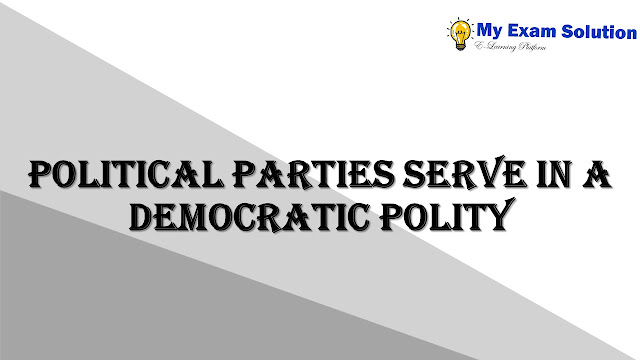Political parties serve in a democratic polity
Political party is an organization that coordinates
candidates to compete in a specific country's elections. It is common for the
members of a party to hold similar ideas about politics, and parties may
promote specific ideological or policy goals. Political parties have become a
major part of the politics of almost every country, as modern party
organizations developed and spread around the world over the last few
centuries. Some countries have only one political party while others have
several. It is extremely rare for a country to have no political parties.
Parties are important in the politics of autocracies as well as democracies,
though usually democracies have more political parties than autocracies.
Autocracies often have a single party that governs the country, and some
political scientists consider competition between two or more parties to be an
essential part of democracy.
Parties can develop from existing divisions in society, like
the divisions between lower and upper classes, and they streamline the process
of making political decisions by encouraging their members to cooperate.
Political parties usually include a party leader, who has primary
responsibility for the activities of the party; party executives, who may
select the leader and who perform administrative and organizational tasks; and
party members, who may volunteer to help the party, donate money to it, and
vote for its candidates. There are many different ways in which political
parties can be structured and interact with the electorate. The contributions
that citizens give to political parties are often regulated by law, and parties
will sometimes govern in a way that favours the people who donate time and
money to them.
Many political parties are motivated by ideological goals.
It is common for democratic elections to feature competitions between liberal,
conservative, and socialist parties; other common ideologies of very large
political parties include communism, populism, nationalism, and Islamism.
Political parties in different countries will often adopt similar colours and
symbols to identify themselves with a particular ideology. However, many
political parties have no ideological affiliation, and may instead be primarily
engaged in patronage, clientelism, or the advancement of a specific political
entrepreneur.
Political parties are collective entities that organize competitions for political offices. The members of a political party contest elections under a shared label. In a narrow definition, a political party can be thought of as just the group of candidates who run for office under a party label. In a broader definition, political parties are the entire apparatus that supp
orts the election of a group of candidates, including voters and volunteers
who identify with a particular political party, the official party
organizations that support the election of that party's candidates, and
legislators in the government who are affiliated with the party Political
parties are distinguished from other political groups and clubs, such as
political factions or interest groups, mostly by the fact that parties are focused
on electing candidates whereas interest groups are focused on advancing a
policy agenda.
This is related to other features that sometimes distinguish
parties from other political organizations, including a larger membership,
greater stability over time, and deeper connection to the electorate.







0 comments:
Note: Only a member of this blog may post a comment.